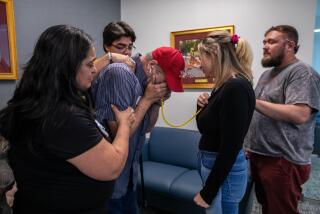Sickest Patients Benefit in Organ Policy Change
- Share via
WASHINGTON — The network that distributes organs for transplants, under pressure from the federal government, agreed Thursday to give the sickest patients in any given region first priority for scarce livers.
The new policy, announced by the nonprofit United Network for Organ Sharing, does not go as far as the Department of Health and Human Services would like--a no-boundary nationwide system for distribution.
Still, the change represents a dramatic softening of resistance by UNOS, an agreement to overhaul the system by giving first consideration to patients in the most dire need--a category called Status 1, defined as those with less than a week to live.
UNOS said that it still disagrees with the approach proposed by federal officials but predicted Thursday that the change will increase the number of transplants performed for the most urgent patients from 14% to 22% and reduce their waiting time from four days to two days.
The organ network, which contracts with the government to allocate organs, currently offers a liver to any medically eligible patient in a local area first, declining in order of medical need, before offering it regionally and then nationally.
Under the policy approved Thursday, a liver will be offered first within a local area; if there are no Status 1 patients in the local area, it will then be offered regionally to a Status 1 patient. Only then could it be considered for a less urgent local candidate.
Under the formula, patients in the Los Angeles area, which encompasses the counties of Los Angeles, Santa Barbara and Ventura, would compete for livers locally. If no patient in the area needs the liver desperately, it will be offered to the region: California, Utah, Arizona, Nevada and New Mexico. If there are no Status 1 patients locally or regionally, the liver will be offered in declining order of medical need within the Los Angeles area.
Nationally, there are about 13,000 patients on waiting lists for livers. Like most organs, liver donations fall far short of demand. But the debate over allocation often becomes intense because there are few medical alternatives to a transplant. Patients and their families have often found themselves railing against institutions that are only complying with rules in allocating the organs.
About 15 months ago, the Clinton administration proposed new rules to overhaul the nationwide distribution system under a policy that would put the sickest patients first. Federal health officials insisted that the most needy patients deserve priority, regardless of where they live, and should move to the head of the list.
Opponents of the administration proposal argue that, with organs in such short supply, they could be wasted on the neediest patients--who often are already desperately ill--and would be better used in patients who have a better chance to live.
The issue has also raised arguments in some quarters over whether those who destroy their livers through drinking, smoking or drug use deserve a scarce replacement organ.
UNOS saw some benefit from the new policy. “Because of the organ shortage, any time we change a policy there will be an effect on all patients,” said Dr. Jeremiah G. Turcotte, chairman of the network’s liver and intestinal organ transplantation committee. “We think this . . . strikes a good balance. It achieves these changes without disrupting the capacity of individual transplant centers to treat patients or significantly increasing the overall death rate among transplant patients.”
But Campbell Gardett, a Department of Health and Human Services spokesman, while conceding the move is “a step forward,” added that the new policy does not go far enough.
“This change addresses only one status of patients--the sickest--and not others who are in the middle,” he said. “It broadens the area in which you share for the sickest people, making it somewhat better. But it’s not the last word. There is more work to be done.”
Lisa Kory, executive director of the Washington-based Transplant Recipients International Organization Inc., a patients’ group, praised the move but said the policy should extend beyond livers to all organs. “Patients must be put first when allocating the precious gift of life.”
UNOS also agreed for the first time to release performance rates on individual transplant centers, including the survival rates of their patients. This move was also sought by HHS but was resisted by many transplant centers who felt the information could be misleading or embarrassing to individual hospitals and physicians.






